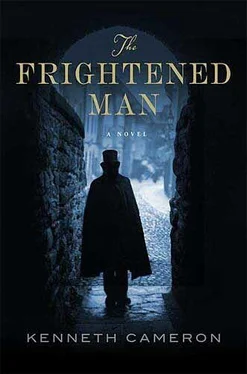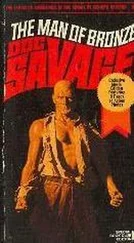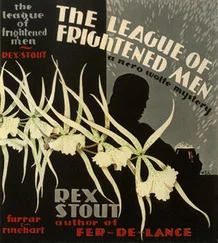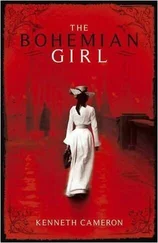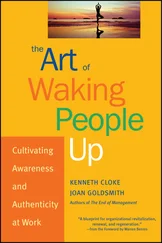Kenneth Cameron - The Frightened Man
Здесь есть возможность читать онлайн «Kenneth Cameron - The Frightened Man» весь текст электронной книги совершенно бесплатно (целиком полную версию без сокращений). В некоторых случаях можно слушать аудио, скачать через торрент в формате fb2 и присутствует краткое содержание. Год выпуска: 2009, Жанр: Детективная фантастика, на английском языке. Описание произведения, (предисловие) а так же отзывы посетителей доступны на портале библиотеки ЛибКат.
- Название:The Frightened Man
- Автор:
- Жанр:
- Год:2009
- ISBN:нет данных
- Рейтинг книги:5 / 5. Голосов: 1
-
Избранное:Добавить в избранное
- Отзывы:
-
Ваша оценка:
- 100
- 1
- 2
- 3
- 4
- 5
The Frightened Man: краткое содержание, описание и аннотация
Предлагаем к чтению аннотацию, описание, краткое содержание или предисловие (зависит от того, что написал сам автор книги «The Frightened Man»). Если вы не нашли необходимую информацию о книге — напишите в комментариях, мы постараемся отыскать её.
The Frightened Man — читать онлайн бесплатно полную книгу (весь текст) целиком
Ниже представлен текст книги, разбитый по страницам. Система сохранения места последней прочитанной страницы, позволяет с удобством читать онлайн бесплатно книгу «The Frightened Man», без необходимости каждый раз заново искать на чём Вы остановились. Поставьте закладку, и сможете в любой момент перейти на страницу, на которой закончили чтение.
Интервал:
Закладка:
‘And if people needed houses to live in, I’d say it was a good thing.’
He glanced aside at her, thought how unsentimental she was — not always an attractive trait. This morning, she looked ugly to him, pinched, her face closed as if by the cold. He wished he’d come on this part of the journey alone. They jogged on for another several minutes, and he said nothing, and she, probably understanding him, didn’t try to talk.
‘Almost there,’ the driver called down to them.
Denton put his head out to look. Off to their left, a different kind of prospect was opening — no low houses and streets, for a change, but a levelled field of the kind he’d come to recognize. It was big, perhaps ten acres, stretching away as flatly as a bed; on three sides, the streets lined it like walls; on the fourth, he could see open space, a line of trees and, distantly, a steeple: this, for now, was the end of the gobbling-up of East Ham.
‘You sure you want the pub?’ the driver said. He was pointing with his whip. The building was far over towards the outer edge of the field; between them and it was a frosted expanse with sewer pipes and water connections sticking up where macadamized streets would run.
‘Is there another?’ Denton said.
‘This’s the only one where they’re still building. I can’t get you closer than the edge here — can’t do it! Wouldn’t risk the horse on them fillings.’ After another hundred yards, he pulled the horse up. ‘Can’t get no closer.’
They got down. Their breath steamed in the windless air. The driver was pointing again, showing them how they could pick their way among piles of building stone and lumber. Denton had already seen the route, noted how it had been pioneered by other feet.
‘Good enough for the workmen, I guess it’s good enough for us,’ he said to her. ‘You needn’t come, if the walking’s too hard.’
She gave him a look. ‘You can’t get rid of me now, Denton; it’s too late.’
They walked into the field. It was made of fill; nobody had been too choosy about what the fill was or where it came from. Denton saw broken crockery, a rusted gear poking up like a jawbone. There was a thin smell of sewage: it was said that some of the new London was built on the cleanings of the old London’s privies.
‘We can ask there for Satterlee,’ she said, pointing at a cluster of men by a stack of cut stone.
‘We can see the pub,’ he said.
‘If the Satterlees are still there. Let’s ask.’
She irritated him, but he did as she wanted. They turned off the track that others had beaten and crossed the rough ground towards the men. He stumbled once over something hard, almost entirely buried and now frozen in, swore, caught himself, the pistol swinging heavily in the overcoat. When they came to them, none of the men paid any notice but stood as they were, gathered in a semicircle around a well-dressed man who had laid out a piece of paper as big as a tablecloth on the building stone. He was saying something about the water table and hydraulic pressure and cellar walls, but when Denton moved around the men to have a look at him, the man glanced up and said, ‘Yes?’ It was less a greeting than a challenge.
‘I’m looking for the site manager.’
‘I’m the site manager.’
‘Satterlee?’
‘You want Satterlee? Should have said so sooner.’ The man gestured over his shoulder with a thumb. ‘Try the public house — might still be there, might not. Removal van was there at six.’ He looked down at the paper plans, looked up again and said, ‘Satterlee’s part of the job is over; he’s moving on.’
‘Where’s he gone?’
‘I told you, I don’t know if he’s gone yet. If he’s gone, I don’t know where. Ask at the company office. In the City.’ He looked down at the plans again and began to trace a line with a finger, talking about four-inch pipe and ‘domestic connections’.
Denton looked towards the pub. Janet Striker was doing the same thing. He could see now that what had been from the road a white dot at one side was now a closed wagon; a horse had separated itself, too, from the dark brick of the building.
‘Removal van,’ Denton said.
‘Too late,’ she said.
‘We don’t know that.’ He started to stride across the rubble; she almost ran to catch up. She told him to slow down, but he paid no attention. Closer by then, he could see two men carrying some big, dark piece of furniture up a ramp to the van’s innards, and he strode faster. When they were a hundred feet away — the men clear now, faces, one taller than the other, a red scarf at a neck — she caught his arm and almost pulled him off balance. ‘Denton!’
He swung around on her.
‘Don’t!’ she said. ‘Don’t go in there like this!’
His instinct was to pull away and charge on. She was panting, more colour in her face now, and he remembered the other days, his liking for her. She became somebody else, not the woman he had resented in the cab. She said, ‘We don’t know .’
He chewed his lower lip. He breathed out — he, too, was a little out of breath. ‘All right.’ He put his hand into the pocket where the Colt rode. ‘You lead.’
Her hand was still on his arm. She passed in front of him very close, and she said, ‘He isn’t your father.’
She led them more slowly over the hard earth, her skirts lifted a little in her hands. Behind her, shortening his stride, he held the bulge of the heavy pistol against his hip with a forearm. When they reached the back of the removal van, they found a kerb and a pavement; the smell of horse surrounded them, straw-filled dung on the ground.
‘The Satterlees?’ she said to one of the removal men, who was coming out of the house with a small armchair held against his chest. He jerked his head back. ‘Inside!’ He was sweating.
She stood aside for the other man, also coming out; she was right at the front doorway then, turned back to Denton, giving him a look as if to say, Now, mind your manners. When she turned back to go in, a young girl was standing in the doorway.
Denton knew it was the right Satterlee because of her. Later, he would be able to anatomize her and explain why he knew, but at that moment he knew only that he could see the dead young woman in her face and his sister in the entirety of her — pose, smile, clothes — which told him all he needed to know about her and about her relationship with her father. A terrible realization struck him: This was how Josie looked. I didn’t remember, but I do — it was this, this look of — of not being a child.
‘We’re looking for Mr and Mrs Satterlee,’ Janet Striker said.
‘Looking’s free,’ the girl said. She laughed.
Mrs Striker glanced at Denton and said, ‘May we come in?’
The girl looked not at her but at Denton. She gave him a smile, cocked her head, gave another smile. Flirting. Denton said, ‘You’re Edna, aren’t you.’
‘I might be.’ She made a movement with her whole body, swaying forward and dropping her right shoulder and then straightening, never taking her eyes from him, the finish of the movement leaving her partly in profile so that if she’d had breasts they’d have been shown well. ‘What’ll you give me if I am?’
‘Is your mother here?’ Janet Striker said.
The girl laughed. ‘She is for as long as the gin lasts.’ She laughed again and looked at Denton. ‘She’s here, but she’s not all there, if you know what I mean!’
The removal men pushed past them then; the girl flattened herself against the open door, but as the younger of the two went past she moved forward so that he brushed against her and she looked up into his face, smiling. The man looked at Denton and Janet Striker and muttered something and went on inside, down a narrow hall to stairs at the back, and up.
Читать дальшеИнтервал:
Закладка:
Похожие книги на «The Frightened Man»
Представляем Вашему вниманию похожие книги на «The Frightened Man» списком для выбора. Мы отобрали схожую по названию и смыслу литературу в надежде предоставить читателям больше вариантов отыскать новые, интересные, ещё непрочитанные произведения.
Обсуждение, отзывы о книге «The Frightened Man» и просто собственные мнения читателей. Оставьте ваши комментарии, напишите, что Вы думаете о произведении, его смысле или главных героях. Укажите что конкретно понравилось, а что нет, и почему Вы так считаете.
